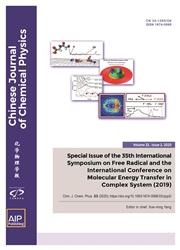Identifying diffusion limiting current to unravel the intrinsic kinetics of electrode reactions affected by mass transfer at rotating disk electrode
IF 1.2
4区 化学
Q4 PHYSICS, ATOMIC, MOLECULAR & CHEMICAL
引用次数: 3
Abstract
Rotating disk electrode systems are widely used to study the kinetics of electrocatalytic reactions that may suffer from insufficient mass transfer of the reactants. Kinetic current density at certain overpotential calculated by the Koutecky-Levich equation is commonly used as the metrics to evaluate the activity of electrocatalysts. However, it is frequently found that the diffusion limiting current density is not correctly identified in the literatures. Instead of kinetic current density, the measured current density normalized by diffusion limiting current density ( j/ jL) has also been frequently under circumstance where its validity is not justified. By taking oxygen reduction reaction/hydrogen oxidation reaction/hydrogen evolution reaction as examples, we demonstrate that identifying the actual diffusion limiting current density for the same reaction under otherwise identical conditions from the experimental data is essential to accurately deduce kinetic current density. Our analysis reveals that j/ jL is a rough activity metric which can only be used to qualitatively compare the activity trend under conditions that the mass transfer conditions and the roughness factor of the electrode are exactly the same. In addition, if one wants to use j/ jL to compare the intrinsic activity, the concentration overpotential should be eliminated.识别扩散限制电流以揭示旋转圆盘电极上受传质影响的电极反应的内在动力学
旋转圆盘电极系统被广泛用于研究可能受到反应物传质不足影响的电催化反应动力学。在一定过电位下,由Koutecky-Levich方程计算的动态电流密度是评价电催化剂活性的常用指标。然而,在文献中经常发现不能正确识别扩散极限电流密度。用扩散极限电流密度(j/ jL)归一化的测量电流密度代替动态电流密度,也经常出现其有效性不合理的情况。以氧还原反应/氢氧化反应/析氢反应为例,证明了从实验数据中确定相同条件下相同反应的实际扩散极限电流密度对于准确推导动力学电流密度至关重要。我们的分析表明,j/ jL是一个粗略的活度度量,只有在传质条件和电极的粗糙度因子完全相同的情况下,才能定性地比较活度趋势。此外,如果要用j/ jL来比较本征活度,则应消除浓度过电位。
本文章由计算机程序翻译,如有差异,请以英文原文为准。
求助全文
约1分钟内获得全文
求助全文
来源期刊

Chinese Journal of Chemical Physics
物理-物理:原子、分子和化学物理
CiteScore
1.90
自引率
10.00%
发文量
2763
审稿时长
3 months
期刊介绍:
Chinese Journal of Chemical Physics (CJCP) aims to bridge atomic and molecular level research in broad scope for disciplines in chemistry, physics, material science and life sciences, including the following:
Theoretical Methods, Algorithms, Statistical and Quantum Chemistry
Gas Phase Dynamics and Structure: Spectroscopy, Molecular Interactions, Scattering, Photochemistry
Condensed Phase Dynamics, Structure, and Thermodynamics: Spectroscopy, Reactions, and Relaxation Processes
Surfaces, Interfaces, Single Molecules, Materials and Nanosciences
Polymers, Biopolymers, and Complex Systems
Other related topics
 求助内容:
求助内容: 应助结果提醒方式:
应助结果提醒方式:


